HURN

Huron Consulting Group Inc.
HURN
(1.8)124,06 USD
12.2% ROA
16.66% ROE
23.76x PER
1.886.390.333,00 USD
104.26% DER
0% Yield
5.8% NPM
Huron Consulting Group Inc. Stock Analysis
Huron Consulting Group Inc. Fundamental Analysis
Fundamental analysis in stock investing is like studying the foundation of a house before buying it. It involves looking at a company's financial health, like its earnings, assets, and debts, to determine if it's a good investment based on its fundamental strength and potential for growth.
| # | Analysis | Rating |
|---|---|---|
| 1 |
ROA
The stock's ability to make a lot of money from its assets shows that it is very profitable, making it a good choice for people who want to invest and make a lot of money. |
|
| 2 |
ROE
The stock's ROE falls within an average range (14.04%), demonstrating satisfactory profitability and efficiency in utilizing shareholders' equity. |
|
| 3 |
DER
The stock has a reasonable amount of debt compared to its ownership (74%), suggesting a balanced financial position and a moderate level of risk. |
|
| 4 |
Revenue Growth
Over the past three years, this company's revenue has consistently grown, demonstrating a positive financial trend that makes it an appealing choice. |
|
| 5 |
Net Profit Growth
This company's net profit has been consistently on the rise over the past three years, indicating a strong financial performance and making it an appealing investment opportunity. |
|
| 6 |
Assets Growth
With a track record of continuous revenue growth in the last three years, this company offers a promising investment opportunity |
|
| 7 |
PBV
The stock's high Price-to-Book Value (P/BV) ratio (3.61x) suggests it's overvalued, potentially making it an expensive investment. |
|
| 8 |
Graham Number
The company's Graham number indicates that it is overvalued compared to its stock price, suggesting a potentially unfavorable investment opportunity. |
|
| 9 |
Dividend Growth
The company's dividend growth has shown no improvement in the past three years, making it a less attractive investment option for those seeking increasing returns. |
|
| 10 |
Dividend
The company has not distributed any dividends in the past three years, which may raise concerns for investors looking for regular income from their investments. |
|
| 11 |
Buffet Intrinsic Value
The company's stock presents a potential concern as it appears overvalued (-374) by Warren Buffett's formula, indicating that its market price exceeds its estimated intrinsic value. |
Huron Consulting Group Inc. Technical Analysis
Technical analysis in stock investing is like reading the patterns on a weather map to predict future weather conditions. It involves studying past stock price movements and trading volumes to make predictions about where a stock's price might go next, without necessarily looking at the company's financial health.
| # | Analysis | Recommendation |
|---|---|---|
| 1 | Awesome Oscillator | Hold |
| 2 | MACD | Buy |
| 3 | RSI | Hold |
| 4 | Stoch RSI | Sell |
Huron Consulting Group Inc. Price Chart
Financial Statements
Financial statements are like report cards for companies. They show how much money a company makes (income statement), what it owns and owes (balance sheet), and where it spends its money (cash flow statement), helping stock investors understand if a company is healthy and worth investing in.
Income Statements
An income statement for a company is like a scoreboard for its profits and losses. It shows how much money the company made (revenue) and how much it spent to make that money (expenses), helping stock investors see if a company is making a profit or not.
Revenue in stock investing is the total amount of money a company earns from its sales, and it's a key factor that investors consider to assess a company's financial performance and growth potential.
| Year | Revenue | Growth |
|---|---|---|
| 2002 | 38.022.013 | |
| 2003 | 110.294.129 | 65.53% |
| 2004 | 173.911.000 | 36.58% |
| 2005 | 225.962.000 | 23.04% |
| 2006 | 321.918.000 | 29.81% |
| 2007 | 547.953.000 | 41.25% |
| 2008 | 615.476.000 | 10.97% |
| 2009 | 679.540.000 | 9.43% |
| 2010 | 604.600.000 | -12.39% |
| 2011 | 657.894.000 | 8.1% |
| 2012 | 681.725.000 | 3.5% |
| 2013 | 787.789.000 | 13.46% |
| 2014 | 889.207.000 | 11.41% |
| 2015 | 769.023.000 | -15.63% |
| 2016 | 797.984.000 | 3.63% |
| 2017 | 807.745.000 | 1.21% |
| 2018 | 877.999.000 | 8% |
| 2019 | 965.474.000 | 9.06% |
| 2020 | 871.014.000 | -10.84% |
| 2021 | 926.958.000 | 6.04% |
| 2022 | 1.158.961.000 | 20.02% |
| 2023 | 1.469.864.000 | 21.15% |
| 2023 | 1.398.755.000 | -5.08% |
| 2024 | 1.524.068.000 | 8.22% |
Research and Development Expenses are the costs a company incurs to create and improve its products or services, which can be important for investors to evaluate a company's innovation and potential for future growth.
| Year | Research and Development Expenses | Growth |
|---|---|---|
| 2002 | 0 | |
| 2003 | 0 | 0% |
| 2004 | 0 | 0% |
| 2005 | 0 | 0% |
| 2006 | 0 | 0% |
| 2007 | 0 | 0% |
| 2008 | 0 | 0% |
| 2009 | 0 | 0% |
| 2010 | 0 | 0% |
| 2011 | 0 | 0% |
| 2012 | 0 | 0% |
| 2013 | 200.000 | 100% |
| 2014 | 800.000 | 75% |
| 2015 | 1.000.000 | 20% |
| 2016 | 1.100.000 | 9.09% |
| 2017 | 800.000 | -37.5% |
| 2018 | 1.400.000 | 42.86% |
| 2019 | 3.000.000 | 53.33% |
| 2020 | 4.700.000 | 36.17% |
| 2021 | 5.200.000 | 9.62% |
| 2022 | 5.900.000 | 11.86% |
| 2023 | 0 | 0% |
| 2023 | 0 | 0% |
| 2024 | 0 | 0% |
General and Administrative Expenses are the costs a company incurs to run its day-to-day operations, such as office rent, salaries, and utilities, which investors consider to understand a company's overall efficiency and management effectiveness.
| Year | General and Administrative Expenses | Growth |
|---|---|---|
| 2002 | 0 | |
| 2003 | 0 | 0% |
| 2004 | 40.858.000 | 100% |
| 2005 | 51.035.000 | 19.94% |
| 2006 | 65.926.000 | 22.59% |
| 2007 | 102.176.000 | 35.48% |
| 2008 | 131.148.000 | 22.09% |
| 2009 | 143.145.000 | 8.38% |
| 2010 | 122.452.000 | -16.9% |
| 2011 | 123.904.000 | 1.17% |
| 2012 | 125.266.000 | 1.09% |
| 2013 | 138.538.000 | 9.58% |
| 2014 | 155.434.000 | 10.87% |
| 2015 | 157.902.000 | 1.56% |
| 2016 | 160.204.000 | 1.44% |
| 2017 | 175.364.000 | 8.64% |
| 2018 | 180.983.000 | 3.1% |
| 2019 | 194.671.000 | 7.03% |
| 2020 | 166.586.001 | -16.86% |
| 2021 | 173.586.000 | 4.03% |
| 2022 | 203.081.000 | 14.52% |
| 2023 | 0 | 0% |
| 2023 | 250.188.000 | 100% |
| 2024 | 0 | 0% |
EBITDA stands for Earnings Before Interest, Taxes, Depreciation, and Amortization. It is a measure that helps stock investors analyze a company's profitability by looking at its earnings without considering certain expenses. This helps to get a clearer picture of the company's financial performance and its ability to generate cash flow.
| Year | EBITDA | Growth |
|---|---|---|
| 2002 | -3.482.200 | |
| 2003 | 5.111.000 | 168.13% |
| 2004 | 22.049.000 | 76.82% |
| 2005 | 38.177.000 | 42.25% |
| 2006 | 58.901.000 | 35.18% |
| 2007 | 108.922.000 | 45.92% |
| 2008 | 118.833.000 | 8.34% |
| 2009 | 27.629.000 | -330.1% |
| 2010 | 66.078.000 | 58.19% |
| 2011 | 80.086.000 | 17.49% |
| 2012 | 115.816.000 | 30.85% |
| 2013 | 107.738.000 | -7.5% |
| 2014 | 121.550.000 | 11.36% |
| 2015 | 155.404.000 | 21.78% |
| 2016 | 122.312.000 | -27.06% |
| 2017 | -154.677.000 | 179.08% |
| 2018 | 83.056.000 | 286.23% |
| 2019 | 101.879.000 | 18.48% |
| 2020 | 12.825.000 | -694.38% |
| 2021 | 120.642.000 | 89.37% |
| 2022 | 154.188.000 | 21.76% |
| 2023 | 217.000.000 | 28.95% |
| 2023 | 161.836.000 | -34.09% |
| 2024 | 206.712.000 | 21.71% |
Gross profit is the money a company makes from selling its products or services after subtracting the cost of producing or providing them, and it is an important measure for investors to understand a company's profitability.
| Year | Gross Profit | Growth |
|---|---|---|
| 2002 | 9.046.070 | |
| 2003 | 31.964.726 | 71.7% |
| 2004 | 66.382.000 | 51.85% |
| 2005 | 89.212.000 | 25.59% |
| 2006 | 124.843.000 | 28.54% |
| 2007 | 203.124.000 | 38.54% |
| 2008 | 191.726.000 | -5.94% |
| 2009 | 228.128.000 | 15.96% |
| 2010 | 205.391.000 | -11.07% |
| 2011 | 224.773.000 | 8.62% |
| 2012 | 241.069.000 | 6.76% |
| 2013 | 276.930.000 | 12.95% |
| 2014 | 311.180.000 | 11.01% |
| 2015 | 297.176.000 | -4.71% |
| 2016 | 288.679.000 | -2.94% |
| 2017 | 277.503.000 | -4.03% |
| 2018 | 273.539.000 | -1.45% |
| 2019 | 301.176.000 | 9.18% |
| 2020 | 251.668.000 | -19.67% |
| 2021 | 268.813.000 | 6.38% |
| 2022 | 346.409.000 | 22.4% |
| 2023 | 452.780.000 | 23.49% |
| 2023 | 419.292.000 | -7.99% |
| 2024 | 467.808.000 | 10.37% |
Net income in stock investing is like the money a company actually gets to keep as profit after paying all its bills, and it's an important measure to understand how well a company is doing financially.
| Year | Net Profit | Growth |
|---|---|---|
| 2002 | -4.166.012 | |
| 2003 | -1.062.417 | -292.13% |
| 2004 | 10.864.000 | 109.78% |
| 2005 | 17.769.000 | 38.86% |
| 2006 | 26.689.000 | 33.42% |
| 2007 | 41.901.000 | 36.3% |
| 2008 | 40.651.000 | -3.07% |
| 2009 | -32.873.000 | 223.66% |
| 2010 | 8.525.000 | 485.61% |
| 2011 | 20.519.000 | 58.45% |
| 2012 | 36.428.000 | 43.67% |
| 2013 | 66.433.000 | 45.17% |
| 2014 | 79.051.000 | 15.96% |
| 2015 | 59.052.000 | -33.87% |
| 2016 | 37.617.000 | -56.98% |
| 2017 | -170.117.000 | 122.11% |
| 2018 | 13.646.000 | 1346.64% |
| 2019 | 41.743.000 | 67.31% |
| 2020 | -23.718.000 | 276% |
| 2021 | 62.987.000 | 137.66% |
| 2022 | 75.552.000 | 16.63% |
| 2023 | 86.064.000 | 12.21% |
| 2023 | 62.479.000 | -37.75% |
| 2024 | 149.928.000 | 58.33% |
EPS, or earnings per share, is a measure that shows how much profit a company has earned for each outstanding share of its stock, and it is important for stock investors as it helps understand the profitability of a company and compare it with other companies in the market.
| Year | Earning per Share (EPS) | Growth |
|---|---|---|
| 2002 | 0 | |
| 2003 | 0 | 0% |
| 2004 | 1 | 0% |
| 2005 | 1 | 100% |
| 2006 | 2 | 0% |
| 2007 | 2 | 50% |
| 2008 | 2 | 0% |
| 2009 | -2 | 300% |
| 2010 | 0 | 0% |
| 2011 | 1 | 0% |
| 2012 | 2 | 100% |
| 2013 | 3 | 50% |
| 2014 | 4 | 33.33% |
| 2015 | 3 | -50% |
| 2016 | 2 | -100% |
| 2017 | -8 | 114.29% |
| 2018 | 1 | 0% |
| 2019 | 2 | 100% |
| 2020 | -1 | 200% |
| 2021 | 3 | 150% |
| 2022 | 4 | 33.33% |
| 2023 | 5 | 25% |
| 2023 | 3 | -33.33% |
| 2024 | 8 | 62.5% |
Cashflow Statements
Cashflow statements show the movement of money in and out of a company, helping stock investors understand how much money a company makes and spends. By examining cashflow statements, investors can assess if a company is generating enough cash to pay its bills, invest in growth, and provide returns to stockholders.
Free cash flow is the leftover cash that a company generates after covering its operating expenses and capital expenditures, which is important for stock investors as it shows how much money a company has available to invest in growth, pay dividends, or reduce debt.
| Year | Free Cashflow | Growth |
|---|---|---|
| 2002 | -12.071.012 | |
| 2003 | -144.403 | -8259.25% |
| 2004 | 5.528.000 | 102.61% |
| 2005 | 17.828.000 | 68.99% |
| 2006 | 24.432.000 | 27.03% |
| 2007 | 34.775.000 | 29.74% |
| 2008 | 81.379.000 | 57.27% |
| 2009 | 107.440.000 | 24.26% |
| 2010 | 41.551.000 | -158.57% |
| 2011 | 94.678.000 | 56.11% |
| 2012 | 83.948.000 | -12.78% |
| 2013 | 93.461.000 | 10.18% |
| 2014 | 120.540.000 | 22.46% |
| 2015 | 144.830.000 | 16.77% |
| 2016 | 113.289.000 | -27.84% |
| 2017 | 74.023.000 | -53.05% |
| 2018 | 86.653.000 | 14.58% |
| 2019 | 108.668.000 | 20.26% |
| 2020 | 120.341.000 | 9.7% |
| 2021 | 2.227.000 | -5303.73% |
| 2022 | 61.101.000 | 96.36% |
| 2023 | 60.740.000 | -0.59% |
| 2023 | 100.076.000 | 39.31% |
| 2024 | 98.215.000 | -1.89% |
Operating cash flow represents the cash generated or consumed by a company's day-to-day operations, excluding external investing or financing activities, and is crucial for stock investors as it shows how much cash a company is generating from its core business operations.
| Year | Operating Cashflow | Growth |
|---|---|---|
| 2002 | -9.759.316 | |
| 2003 | 4.034.135 | 341.92% |
| 2004 | 12.471.000 | 67.65% |
| 2005 | 25.994.000 | 52.02% |
| 2006 | 42.542.000 | 38.9% |
| 2007 | 53.684.000 | 20.75% |
| 2008 | 101.200.000 | 46.95% |
| 2009 | 120.056.000 | 15.71% |
| 2010 | 50.051.000 | -139.87% |
| 2011 | 108.617.000 | 53.92% |
| 2012 | 105.589.000 | -2.87% |
| 2013 | 115.258.000 | 8.39% |
| 2014 | 146.453.000 | 21.3% |
| 2015 | 164.267.000 | 10.84% |
| 2016 | 128.311.000 | -28.02% |
| 2017 | 99.795.000 | -28.57% |
| 2018 | 101.658.000 | 1.83% |
| 2019 | 132.220.000 | 23.11% |
| 2020 | 136.738.000 | 3.3% |
| 2021 | 17.987.000 | -660.2% |
| 2022 | 85.400.000 | 78.94% |
| 2023 | 68.774.000 | -24.17% |
| 2023 | 135.262.000 | 49.15% |
| 2024 | 107.221.000 | -26.15% |
Capex, short for capital expenditures, refers to the money a company spends on acquiring or upgrading tangible assets like buildings, equipment, or technology, which is important for stock investors as it indicates how much a company is investing in its infrastructure to support future growth and profitability.
| Year | Capital Expenditure | Growth |
|---|---|---|
| 2002 | 2.311.696 | |
| 2003 | 4.178.538 | 44.68% |
| 2004 | 6.943.000 | 39.82% |
| 2005 | 8.166.000 | 14.98% |
| 2006 | 18.110.000 | 54.91% |
| 2007 | 18.909.000 | 4.23% |
| 2008 | 19.821.000 | 4.6% |
| 2009 | 12.616.000 | -57.11% |
| 2010 | 8.500.000 | -48.42% |
| 2011 | 13.939.000 | 39.02% |
| 2012 | 21.641.000 | 35.59% |
| 2013 | 21.797.000 | 0.72% |
| 2014 | 25.913.000 | 15.88% |
| 2015 | 19.437.000 | -33.32% |
| 2016 | 15.022.000 | -29.39% |
| 2017 | 25.772.000 | 41.71% |
| 2018 | 15.005.000 | -71.76% |
| 2019 | 23.552.000 | 36.29% |
| 2020 | 16.397.000 | -43.64% |
| 2021 | 15.760.000 | -4.04% |
| 2022 | 24.299.000 | 35.14% |
| 2023 | 8.034.000 | -202.45% |
| 2023 | 35.186.000 | 77.17% |
| 2024 | 9.006.000 | -290.7% |
Balance Sheet
Balance sheets provide a snapshot of a company's financial health and its assets (such as cash, inventory, and property) and liabilities (like debts and obligations) at a specific point in time. For stock investors, balance sheets help assess the company's overall worth and evaluate its ability to meet financial obligations and support future growth.
Equity refers to the ownership interest or stake that shareholders have in a company, representing their claim on its assets and earnings after all debts and liabilities are paid.
| Year | Equity | Growth |
|---|---|---|
| 2002 | -4.543.278 | |
| 2003 | -6.623.747 | 31.41% |
| 2004 | 49.233.000 | 113.45% |
| 2005 | 75.532.000 | 34.82% |
| 2006 | 116.580.000 | 35.21% |
| 2007 | 183.784.000 | 36.57% |
| 2008 | 319.026.000 | 42.39% |
| 2009 | 326.989.000 | 2.44% |
| 2010 | 348.372.000 | 6.14% |
| 2011 | 396.789.000 | 12.2% |
| 2012 | 445.321.000 | 10.9% |
| 2013 | 530.264.000 | 16.02% |
| 2014 | 600.634.000 | 11.72% |
| 2015 | 652.325.000 | 7.92% |
| 2016 | 648.033.000 | -0.66% |
| 2017 | 503.316.000 | -28.75% |
| 2018 | 540.624.000 | 6.9% |
| 2019 | 585.465.000 | 7.66% |
| 2020 | 551.942.000 | -6.07% |
| 2021 | 571.900.000 | 3.49% |
| 2022 | 552.040.000 | -3.6% |
| 2023 | 532.892.000 | -3.59% |
| 2023 | 553.354.000 | 3.7% |
| 2024 | 500.578.000 | -10.54% |
Assets represent the valuable resources that a company owns, such as cash, inventory, property, and equipment, and understanding a company's assets helps investors assess its value and potential for generating future profits.
| Year | Assets | Growth |
|---|---|---|
| 2002 | 26.582.659 | |
| 2003 | 39.888.710 | 33.36% |
| 2004 | 83.219.000 | 52.07% |
| 2005 | 129.699.000 | 35.84% |
| 2006 | 199.444.000 | 34.97% |
| 2007 | 443.213.000 | 55% |
| 2008 | 779.597.000 | 43.15% |
| 2009 | 754.215.000 | -3.37% |
| 2010 | 788.983.000 | 4.41% |
| 2011 | 786.644.000 | -0.3% |
| 2012 | 787.850.000 | 0.15% |
| 2013 | 885.600.000 | 11.04% |
| 2014 | 1.155.914.000 | 23.39% |
| 2015 | 1.164.160.000 | 0.71% |
| 2016 | 1.153.215.000 | -0.95% |
| 2017 | 1.036.928.000 | -11.21% |
| 2018 | 1.049.532.000 | 1.2% |
| 2019 | 1.104.271.000 | 4.96% |
| 2020 | 1.057.476.000 | -4.43% |
| 2021 | 1.119.349.000 | 5.53% |
| 2022 | 1.199.040.000 | 6.65% |
| 2023 | 1.262.142.000 | 5% |
| 2023 | 1.282.300.000 | 1.57% |
| 2024 | 1.325.913.000 | 3.29% |
Liabilities refer to the financial obligations or debts that a company owes to creditors or external parties, and understanding a company's liabilities is important for investors as it helps assess the company's financial risk and ability to meet its obligations.
| Year | Liabilities | Growth |
|---|---|---|
| 2002 | 31.125.937 | |
| 2003 | 46.512.457 | 33.08% |
| 2004 | 33.986.000 | -36.86% |
| 2005 | 54.167.000 | 37.26% |
| 2006 | 82.864.000 | 34.63% |
| 2007 | 259.429.000 | 68.06% |
| 2008 | 460.571.000 | 43.67% |
| 2009 | 427.226.000 | -7.81% |
| 2010 | 440.611.000 | 3.04% |
| 2011 | 389.855.000 | -13.02% |
| 2012 | 342.529.000 | -13.82% |
| 2013 | 355.336.000 | 3.6% |
| 2014 | 555.280.000 | 36.01% |
| 2015 | 511.835.000 | -8.49% |
| 2016 | 505.182.000 | -1.32% |
| 2017 | 533.612.000 | 5.33% |
| 2018 | 508.908.000 | -4.85% |
| 2019 | 518.806.000 | 1.91% |
| 2020 | 505.534.000 | -2.63% |
| 2021 | 547.449.000 | 7.66% |
| 2022 | 647.000.000 | 15.39% |
| 2023 | 729.250.000 | 11.28% |
| 2023 | 728.946.000 | -0.04% |
| 2024 | 825.335.000 | 11.68% |
Huron Consulting Group Inc. Financial Ratio (TTM)
Valuation Metrics
- Revenue per Share
- 81.73
- Net Income per Share
- 4.46
- Price to Earning Ratio
- 23.76x
- Price To Sales Ratio
- 1.29x
- POCF Ratio
- 15.1
- PFCF Ratio
- 21.11
- Price to Book Ratio
- 3.79
- EV to Sales
- 1.66
- EV Over EBITDA
- 13.71
- EV to Operating CashFlow
- 19.31
- EV to FreeCashFlow
- 27.15
- Earnings Yield
- 0.04
- FreeCashFlow Yield
- 0.05
- Market Cap
- 1,89 Bil.
- Enterprise Value
- 2,43 Bil.
- Graham Number
- 53.01
- Graham NetNet
- -29.16
Income Statement Metrics
- Net Income per Share
- 4.46
- Income Quality
- 1.57
- ROE
- 0.15
- Return On Assets
- 0.06
- Return On Capital Employed
- 0.13
- Net Income per EBT
- 0.78
- EBT Per Ebit
- 0.79
- Ebit per Revenue
- 0.09
- Effective Tax Rate
- 0.22
Margins
- Sales, General, & Administrative to Revenue
- 0.04
- Research & Developement to Revenue
- 0
- Stock Based Compensation to Revenue
- 0.03
- Gross Profit Margin
- 0.3
- Operating Profit Margin
- 0.09
- Pretax Profit Margin
- 0.07
- Net Profit Margin
- 0.06
Dividends
- Dividend Yield
- 0
- Dividend Yield %
- 0
- Payout Ratio
- 0
- Dividend Per Share
- 0
Operating Metrics
- Operating Cashflow per Share
- 7.02
- Free CashFlow per Share
- 5
- Capex to Operating CashFlow
- 0.29
- Capex to Revenue
- 0.02
- Capex to Depreciation
- 1.49
- Return on Invested Capital
- 0.1
- Return on Tangible Assets
- 0.12
- Days Sales Outstanding
- 94.25
- Days Payables Outstanding
- 3.47
- Days of Inventory on Hand
- -2.15
- Receivables Turnover
- 3.87
- Payables Turnover
- 105.14
- Inventory Turnover
- -169.5
- Capex per Share
- 2.03
Balance Sheet
- Cash per Share
- 1,32
- Book Value per Share
- 27,99
- Tangible Book Value per Share
- -9.56
- Shareholders Equity per Share
- 27.99
- Interest Debt per Share
- 28.41
- Debt to Equity
- 1.04
- Debt to Assets
- 0.39
- Net Debt to EBITDA
- 3.05
- Current Ratio
- 1.93
- Tangible Asset Value
- -0,17 Bil.
- Net Current Asset Value
- -0,39 Bil.
- Invested Capital
- 927120000
- Working Capital
- 0,21 Bil.
- Intangibles to Total Assets
- 0.51
- Average Receivables
- 0,39 Bil.
- Average Payables
- 0,01 Bil.
- Average Inventory
- -6761499.5
- Debt to Market Cap
- 0.28
Dividends
Dividends in stock investing are like rewards that companies give to their shareholders. They are a portion of the company's profits distributed to investors, typically in the form of cash payments, as a way for them to share in the company's success.
| Year | Dividends | Growth |
|---|
Huron Consulting Group Inc. Profile
About Huron Consulting Group Inc.
Huron Consulting Group Inc., a professional services firm, provides consultancy services in the United States and internationally. It operates through three segments: Healthcare, Business Advisory, and Education. The Healthcare segment provides advisory services in the areas of financial and operational improvement, care transformation, and revenue cycle managed services; organizational transformation; and digital, technology and analytic solutions to national and regional hospitals, integrated health systems, academic medical centers, community hospitals, medical groups, and health plans. The Business Advisory segment offers cloud-based technology, analytics, restructuring, and capital advisory solutions to life science, financial, healthcare, education, energy and utilities, and industrials and manufacturing industries, as well as to public sectors. The Education segment provides research enterprise and student lifecycle; digital, technology and analytic solutions; and organizational transformation services to public and private colleges and universities, academic medical centers, research institutes, and other not-for-profit organizations. Huron Consulting Group Inc. was incorporated in 2002 and is headquartered in Chicago, Illinois.
- CEO
- Mr. C. Mark Hussey C.F.A., C.M
- Employee
- 5.896
- Address
-
550 West Van Buren Street
Chicago, 60607
Huron Consulting Group Inc. Executives & BODs
| # | Name | Age |
|---|---|---|
| 1 |
Mr. C. Mark Hussey C.F.A., C.M.A., CPA, M.B.A. President, Chief Executive Officer & Director |
70 |
| 2 |
Mr. John D. Kelly CPA, M.S. Executive Vice President, Chief Financial Officer & Treasurer |
70 |
| 3 |
Mr. Kyle D. Featherstone Chief Accounting Officer & Corporate Vice President |
70 |
| 4 |
Mr. Sean Freeburger Chief Information Officer |
70 |
| 5 |
Ms. Hope Katz Corporate Vice President of Legal Affairs & Corporate Secretary |
70 |
| 6 |
Allie Bovis Public Relations Manager |
70 |
| 7 |
Elizabeth Entinghe Corporate Vice President of Corporate Development & Chief of Staff |
70 |
| 8 |
Sarah McHugh Corporate Vice President & Chief Marketing Officer |
70 |
| 9 |
Ms. Kristen Bruner Chief Human Resources Officer & Corporate Vice President |
70 |
| 10 |
Mr. J. Ronald Dail Executive Vice President & Chief Operating Officer |
70 |




